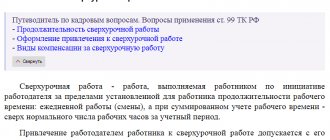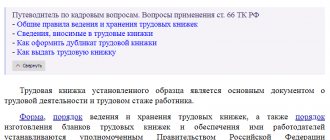Duration of vacation: understanding the terminology
According to Art.
120 of the Labor Code of the Russian Federation, annual basic paid leave is provided in calendar days, therefore, it does not matter what day according to the calendar and schedule the vacation time falls on. Its minimum duration is 28 calendar days (Article 115 of the Labor Code of the Russian Federation). But there are employees who are entitled to extended leave: disabled people, civil servants, teaching staff, minors, etc. The duration of leave does not include only non-working holidays, which are defined in Art. 112 Labor Code of the Russian Federation. So, for example, if an employee takes vacation from June 1 to June 28, then he needs to leave the vacation not on June 29, but on June 30, since the vacation days include a non-working holiday - June 12. In this case, the order to grant leave to the employee is completed simply: in the line “Annual paid leave” 28 calendar days are indicated, and in the period “from ... to” the dates from June 1 to June 29 are written.
Rescheduled weekends, which are included in the vacation duration, should not be confused with non-working holidays. Please note how the transfer of holidays in 2020 is established.
Vacation pay
No later than three days before the start of the vacation, the employee must be paid vacation pay. The amount of vacation pay is subject to personal income tax, unified social tax, contributions to compulsory pension insurance and insurance against accidents and occupational diseases in the general manner. The procedure for calculating vacation pay is stipulated in Article 139 of the Labor Code of the Russian Federation.
If the leave was granted to the employee in advance and the employee was dismissed before the end of the year for which he received this leave, then the leave pay paid to this employee is withheld from his salary.
No deduction is made if the employee:
- dismissed due to refusal to transfer for health reasons (based on a medical report) or due to the fact that the employer does not have the opportunity to provide such an employee with a place that meets the requirements specified by the medical report;
- dismissed due to staff reduction or liquidation of an organization or individual entrepreneur;
- is a manager, his deputy or chief accountant who was dismissed due to a change in the ownership of the organization’s property;
- dismissed due to conscription for military service or sent to alternative civilian service;
- was dismissed earlier and reinstated by decision of the State Tax Inspectorate or the court;
- is recognized as completely incapacitated based on a medical report;
- died or was declared dead or missing by the court;
- dismissed due to the death of the employer, as well as due to the court recognizing the employer as deceased or missing;
- cannot continue to work due to emergency circumstances.
Vacation experience: what is included in it?
All rules for determining length of service giving the right to annual paid leave are laid down in Art. 121 Labor Code of the Russian Federation. And here it is important to pay attention to the fact that it includes not only the time of actual work, but also periods when the employee did not actually work, but retained his place of work (position).
Also in Art. 121 of the Labor Code of the Russian Federation specifies the time of unpaid leave provided at the request of an employee, not exceeding 14 calendar days during the working year. This rule means that 14 days are always included in the length of service giving the right to annual paid leave, and anything that exceeds these 14 days delays the end of the working year. This is also stated in the Letter of Rostrud dated June 14, 2012 No. 854-6-1.
In addition to the above-mentioned cases, the length of service that gives the right to annual basic paid leave includes: time of forced absence in the event of illegal dismissal or suspension from work and subsequent reinstatement to the previous job; the period of suspension from work of an employee who did not undergo a mandatory medical examination through no fault of his own, and other periods. This topic is discussed in more detail in the article Vacation experience: how to determine in various situations.
Leave without pay
Leave without pay comes in different forms. There are those that are provided upon a written application from the employee with the consent of the employer. And there are either categories of employees or certain life situations when, at the written request of the employee, the employer is obliged to provide a certain number of days of vacation without pay. These norms are reflected in Art. 128 Labor Code of the Russian Federation.
For family reasons and other valid reasons, an employee, upon his written application, may be (that is, in this situation, the employer has the full right to refuse) granted leave without pay, the duration of which is determined by agreement between the employee and the employer.
At the same time, the employer is obliged, based on a written application from the employee, to provide leave without pay:
- participants of the Great Patriotic War - up to 35 calendar days per year;
- for working old-age pensioners (by age) - up to 14 calendar days per year;
- parents and wives (husbands) of military personnel, employees of internal affairs bodies, the federal fire service, etc. - up to 14 calendar days a year;
- for working disabled people - up to 60 calendar days per year;
- employees in cases of the birth of a child, marriage registration, death of close relatives - up to 5 calendar days. Please note that the period during which an employee can exercise his right to write an application for such leave is not defined. The facts themselves matter. Therefore, when submitting unpaid leave in this case, the employer must check the occurrence of events: for example, was the birth of a child a legal fact and did the employee write a written statement?
Questions often arise about how to determine the working year for part-time workers. In this case, you need to focus on Art. 121 of the Labor Code, it states that the length of service giving the right to leave includes not only the time of actual work, but also the time when the employee did not actually work, but the work time was retained for him. In addition, Art. 93 of the Labor Code of the Russian Federation indicates that part-time work does not entail for employees any restrictions on the duration of the annual basic paid leave, calculation of length of service and other labor rights?
Calculate vacation pay automatically and without errors
To learn more
Another common question when applying for vacation pay: is it worth including in the length of service that gives the right to annual leave the period when the employee was on parental leave, but at the same time working part-time? Working part-time while on parental leave entitles the employee to leave. But there is one caveat: you cannot provide parental leave and annual basic paid leave at the same time. And this norm is reflected in the Resolution of the Plenum of the Armed Forces of the Russian Federation dated January 28, 2014 No. 1.
Therefore, if a part-time employee during parental leave expresses a desire to go on annual basic paid leave, the employer needs to do the following:
- take from the employee an application to interrupt parental leave (and if the child is under 1.5 years old, then also an application to terminate the payment of child care benefits before reaching the age of 1.5 years);
- issue an order (in any form) to interrupt parental leave and terminate the provision of benefits;
- accept the employee’s application for annual basic paid leave;
- issue a leave order;
- after the vacation, take the employee’s application again with a request to provide parental leave until the child reaches the age of 3 years.
What do you need to know about holiday entitlement?
Employers should adhere to the basic rule - paid leave must be provided to the employee annually, because this is required by the Labor Code.
At the same time, in Art. 124 of the Labor Code of the Russian Federation contains the following clause: “In exceptional cases, when the provision of leave to an employee in the current working year may adversely affect the normal course of work of an organization or individual entrepreneur, it is allowed, with the consent of the employee, to transfer the leave to the next working year. In this case, the leave must be used no later than 12 months after the end of the working year for which it is granted.”
The right to use vacation for the first year of work arises for the employee after six months of his continuous work with the employer, although by agreement of the parties it can be granted earlier. Some employers find this definition misleading. They reason like this: the employee can indeed write a statement, but the employer has the right to decide whether he will let him go on vacation or not. From a legal point of view, after six months of work, the employee has every right to write an application for leave for all 28 days, and the employer is obliged to provide him with this leave.
Leave for the second and subsequent years of work can be granted at any time of the working year in accordance with the order of provision of annual paid leave established by the employer.
Leaves associated with the birth of children and caring for them
The employer provides pregnant employees with leave for a period of 140 to 194 days, depending on the type of pregnancy. The basis for this is a personal statement and a sick leave certificate issued at the antenatal clinic (Article 255 of the Labor Code of the Russian Federation).
After pre-maternity leave, employees have the right to write an application for parental leave. It is provided until the child reaches the age of 3 years. Fathers, grandparents or guardians can also take this type of leave.
All payments related to childbirth and child care are made at the expense of the Social Insurance Fund. The amount is calculated based on average earnings , but the information is taken for the last two years, and not for the year, as when paying “regular” vacation pay.
How to properly divide your vacation into parts?
In the vacation schedule, employers often indicate parts of the vacation. The norms of ILO Convention No. 132, namely Art. 8 allow this: “The division of annual leave with pay may be authorized by the competent authority or other appropriate authority in each country.”
In Part 1 of Art. 125 of the Labor Code of the Russian Federation states that, by agreement between the employee and the employer, annual paid leave can be divided into parts, and at least one of the parts of this leave must be at least 14 calendar days. Often the employer shows exactly this breakdown in the vacation schedule - 14 days and 14 days. Seeing this, the inspector from the GIT begins to ask questions. The employer has nothing to fear if he has “safety net” in the form of an agreement between the parties. If there are no agreements, then he may be brought to administrative liability under Part 1 of Art. 5.27 Code of Administrative Offences.
The continuous part of the annual paid leave (14 days), which is mentioned in paragraph 2 of Art. 8 of the ILO Convention, is granted and used no later than within one year, and the balance of annual paid leave no later than within 18 months after the end of the year for which the leave is granted.
In Art. 9 of ILO Convention No. 132 specifies that “any part of annual leave in excess of the established minimum duration may be deferred, with the consent of the employee, for a period exceeding that specified in paragraph 1 of this Article, but not exceeding certain separately established limits.”
If the employer violated the law and for some reason the employees were not given vacations for several years, then upon dismissal of these employees, the employer is obliged to pay them compensation for all unused vacations (Article 127 of the Labor Code of the Russian Federation). The concept of “burnt out” does not exist for a vacation.
Letter of Rostrud dated 06/08/2007 No. 1921-6 also recalls the preservation of the right to use all due annual paid leaves: “Annual leaves for previous working periods can be provided either as part of the leave schedule for the next calendar year, or by agreement between the employee and the employer.” .
At the time of inspection, the State Tax Inspectorate usually always requests a vacation schedule, while asking for employees’ personal cards (T-2) selectively. And we need to remember this. If an employer leaves a violation in the form of vacation arrears on his personal card, he can avoid problems, and if he enters the entire debt into the vacation schedule, then he actually voluntarily admits to violations.
Annual paid vacation
This is a “basic” type of leave that an employer is required to provide to all employees. The standard duration of annual leave is 28 calendar days (Article 115 of the Labor Code of the Russian Federation). This period does not include holidays and sick leave. The vacation must be extended by the number of days “lost” for the specified reasons. It is allowed to divide the vacation into parts, but on the condition that one of these parts will be at least 14 days (Article 125 of the Labor Code of the Russian Federation).
For employees who work under fixed-term contracts, there is a special procedure for calculating the duration of vacation:
- Two days of rest are provided per six-day working week for each month worked:
- employees who work under fixed-term contracts lasting up to 2 months, not related to seasonal work (Article 291 of the Labor Code of the Russian Federation);
- seasonal workers, regardless of the duration of the contract (Article 295 of the Labor Code of the Russian Federation).
- Employees who work under fixed-term contracts lasting more than 2 months (except for seasonal work) are granted 2.33 calendar days of vacation for each month.
There are categories of workers who are entitled to longer leave. These include:
- minors (Article 267 of the Labor Code of the Russian Federation);
- disabled people (Article 23 of Law No. 181-FZ dated November 24, 1995);
- workers of children's, educational institutions, medicine and social services (Resolution of the Government of the Russian Federation of October 1, 2002 No. 724);
- civil servants (Article 46 of Law No. 79-FZ dated July 27, 2004);
- municipal employees (Article 21 of Law No. 25-FZ dated March 2, 2007).
The specific duration of extended leave depends both on the employee’s membership in a preferential category and on other factors - place of work, working conditions, length of service, etc.
In general, the right to leave is granted to employees whose work experience with a given employer is at least 6 months. But by agreement with management, newcomers can also take advantage of the right to rest. In this case, you need to remember that vacation pay is issued “in advance.” And if the employee quits soon after the vacation, then part of the amount received will need to be deducted in the final settlement with him.
Part of the vacation can be replaced with monetary compensation, but only if its duration exceeds the “standard” 28 days. You can receive a payment instead of all days of rest beyond 28 per year or instead of part of this excess. Vacation cannot be replaced with compensation for minors, pregnant women and those who work in harmful or dangerous conditions (Article 126 of the Labor Code of the Russian Federation).
The HR department must, by December 31, draw up and approve the vacation schedule for the next year with the manager. It is acceptable to indicate either the exact start date of the vacation or just the month. If the schedule indicates a date, then you can send the employee on vacation without an application, but you must notify him of the start of the vacation 2 weeks in advance. If the schedule includes only a month, then the employee must write a statement himself no later than 14 days before going on vacation.
The vacation schedule is drawn up taking into account the wishes of employees, but some of them have priority rights.
| A priority | Workers |
| They can choose any time convenient for them | - one of the parents of a disabled minor child (Article 262.1 of the Labor Code of the Russian Federation); — minor workers (Article 267 of the Labor Code of the Russian Federation); — honorary donors (Article 23 of Law No. 125-FZ dated July 20, 2012); — employees previously called back from vacation (Article 125 of the Labor Code of the Russian Federation); - participants in combat operations, disabled war veterans (Articles 14 and 16 of the Law of January 12, 1995 No. 5-FZ “On Veterans”); - spouses of military personnel (Article 11 of Law No. 76-FZ dated May 27, 1998 “On the status of military personnel”); - employees who have been awarded the title “Hero of Labor” and “Hero of Russia” (Article 8 of Law No. 4301-1 of January 15, 1993 “On the Status of Heroes”); - employees with from 3 children under 12 years of age (Article 262.2 of the Labor Code of the Russian Federation). |
| Can go on vacation regardless of length of service and schedule | — pregnant women before or after maternity leave and employees who have adopted children under the age of 3 months (Article 122 of the Labor Code of the Russian Federation); - resigning employees instead of working off (Article 127 of the Labor Code of the Russian Federation); — male employees whose spouse is on maternity leave (Article 123 of the Labor Code of the Russian Federation); - part-time workers, if they are granted leave at their main place of work (Article 286 of the Labor Code of the Russian Federation). |
The vacation schedule can only be changed with the consent of both parties - the employee and the employer. In this case, all adjustments must be made in writing.
The rules for calculating vacation pay are regulated by Art. 139 Labor Code of the Russian Federation. For this purpose, the average employee's earnings . In general, the amount of annual income is divided by 12 months and by the average monthly number of days - 29.3. Vacation pay must be paid no later than three working days before the start of the vacation.
Transferring vacation legally
The vacation schedule is mandatory for both the employer and the employee (Article 123 of the Labor Code of the Russian Federation). Therefore, both of them must follow it. All cases of transferring vacation are determined by law - in Art. 124 Labor Code of the Russian Federation. These cases include:
- temporary disability of the employee;
- the employee performs state duties during his annual paid leave, if the labor legislation provides for exemption from work for this purpose;
- in other cases provided for by labor legislation and local regulations. For example, in the internal labor regulations in the “Rest time” section, a clause may be included that, upon a written application from the employee, vacation can be postponed to another period with the consent of the employer, but within the calendar year. In this case, the estimated and actual dates will not legally coincide;
- if the employee was not paid in a timely manner for the duration of the annual paid leave or the employee was warned about the start time of this leave later than two weeks before its start, then the employer, upon a written application from the employee, is obliged to postpone the annual paid leave to another date agreed with the employee.
Providing leave
The employee must be granted leave before the end of the current working year. If there are reasons why leave cannot be granted within the period specified in the leave schedule, then a new leave date must be determined by agreement with the employee.
Refusal to grant leave for two consecutive years is prohibited.
If the employment contract with the employee was concluded for a period of less than 2 months, then instead of leave upon dismissal, compensation may be provided. Its size is calculated as follows: two working days for one month of work.
Compensation for unused vacation
In accordance with Art. 126 of the Labor Code of the Russian Federation, part of the annual paid leave exceeding 28 calendar days, upon a written application from the employee, can be replaced by monetary compensation. We are talking about disabled people, minors, pelagic workers and other workers who are entitled to leave of more than 28 days.
As for all other employees, even if they have not taken vacation for several years, they cannot replace these vacations with compensation. In accordance with Art. 127 of the Labor Code of the Russian Federation, compensation is possible only upon dismissal of an employee. This topic is discussed in more detail in the article Vacation compensation: when can vacation be replaced with money?
Extended holidays
The Labor Code of the Russian Federation establishes the circle of workers who have the right to extended leave. This circle includes:
- minor workers whose vacation, in accordance with Art. 267 of the Labor Code of the Russian Federation, must be equal to 31 working days;
- employees with a confirmed disability, for whom the duration of the main vacation is 30 days or more in accordance with the provisions of the Law of the Russian Federation “On Social Protection of Disabled Persons”;
- rescuers of emergency rescue services, the duration of the main vacation of which can vary from 30 to 40 days depending on the length of service in their specialty (Law of the Russian Federation “On Emergency Rescue Services and the Status of Rescuers”);
- civil servants whose vacation duration is from 30 to 35 (Law of the Russian Federation “On the State Civil Service of the Russian Federation”);
- prosecutors, investigators, scientific and teaching workers, the duration of whose main vacation is 30 calendar days (Law of the Russian Federation “On the Prosecutor’s Office”);
- judges, whose main leave can vary from 30 to 45 working days in accordance with the conditions determined by the Law of the Russian Federation “On the Status of Judges”;
- workers whose work activities involve chemical weapons. The duration of their main leave may vary under the conditions determined by the Law of the Russian Federation “On the social protection of citizens engaged in work with chemical weapons”;
- teaching staff. In accordance with Decree No. 724 of the Government of the Russian Federation dated October 1, 2002, the main leave of teaching staff varies from 42 to 56 days, depending on the position of the teaching staff and the type of educational institution in which he works;
In addition to the listed categories of workers, there are also categories whose increased duration of rest is established by regulations of the Government of the Russian Federation.
For example:
- Resolution No. 949 of the Government of the Russian Federation dated August 12, 1994 established the duration of the main leave of up to 36 days for candidates of sciences;
- Resolution No. 391 of 04/03/96 established the duration of the main leave of up to 36 days for employees of health care institutions whose activities are related to the diagnosis and treatment of HIV-infected people.
Basic principles for calculating vacation pay
Art. 139 of the Labor Code of the Russian Federation states that average earnings are calculated for 12 calendar months preceding the period during which the employee retains the average salary. In this case, a calendar month is considered to be the period from the 1st to the 30th (31st) day of the corresponding month inclusive (in February - to the 28th (29th) day inclusive). Average daily earnings for vacation pay and compensation for unused vacations are calculated for the last 12 calendar months by dividing the amount of accrued wages by 12 and by 29.3 (the average monthly number of calendar days).
Average daily earnings = Actual accrued salary for the billing period: 12: 29.3
Another key document that clarifies this issue is Decree of the Government of the Russian Federation dated December 24, 2007 No. 922. Clause 6 clarifies that if the employee did not have actual accrued wages or actually worked days for the billing period or for a period exceeding the billing period , or this period consisted of time excluded from the calculation period in accordance with paragraph 5 of the Resolution, the average earnings are determined based on the amount of wages actually accrued for the previous period, equal to the calculation period.









